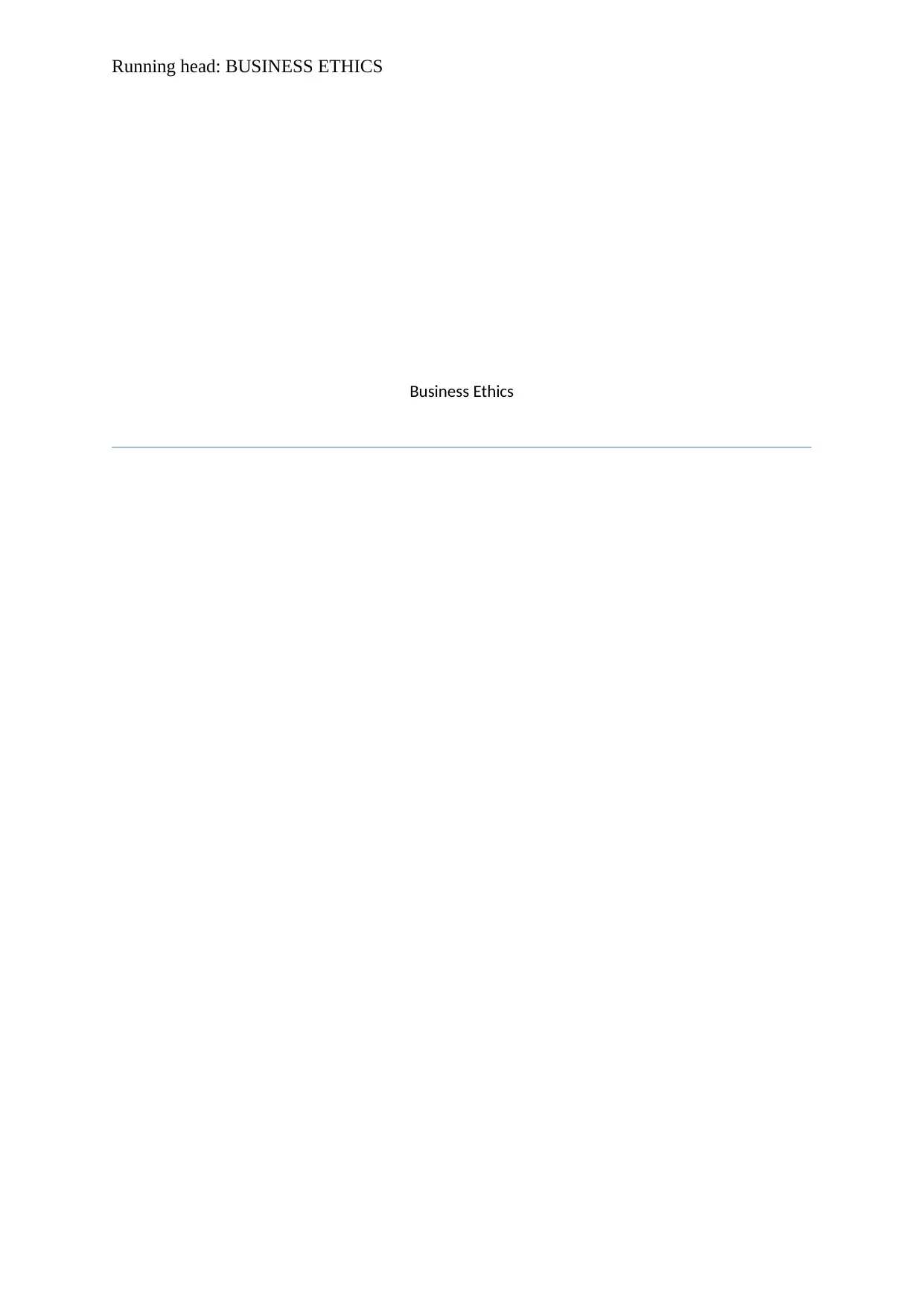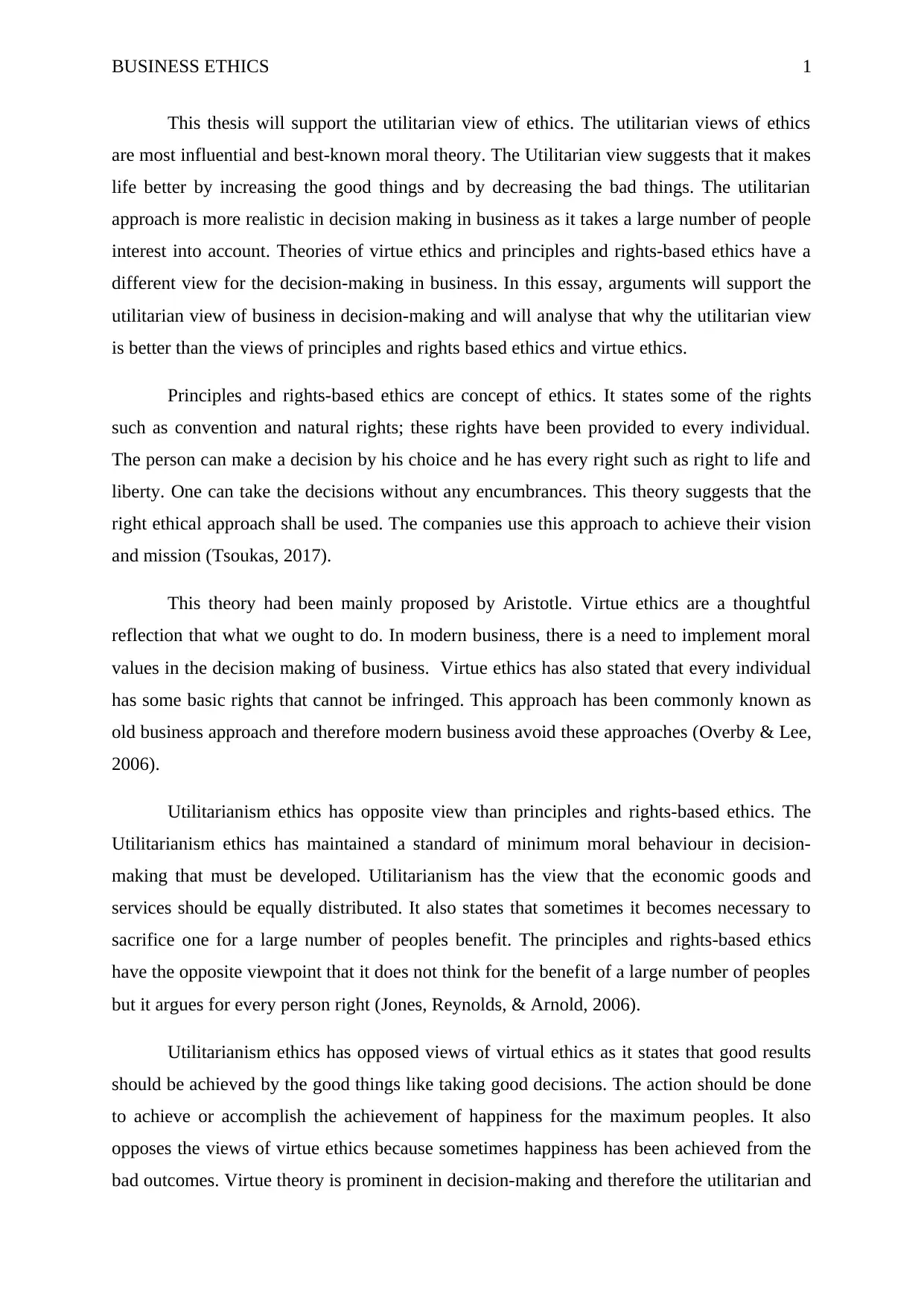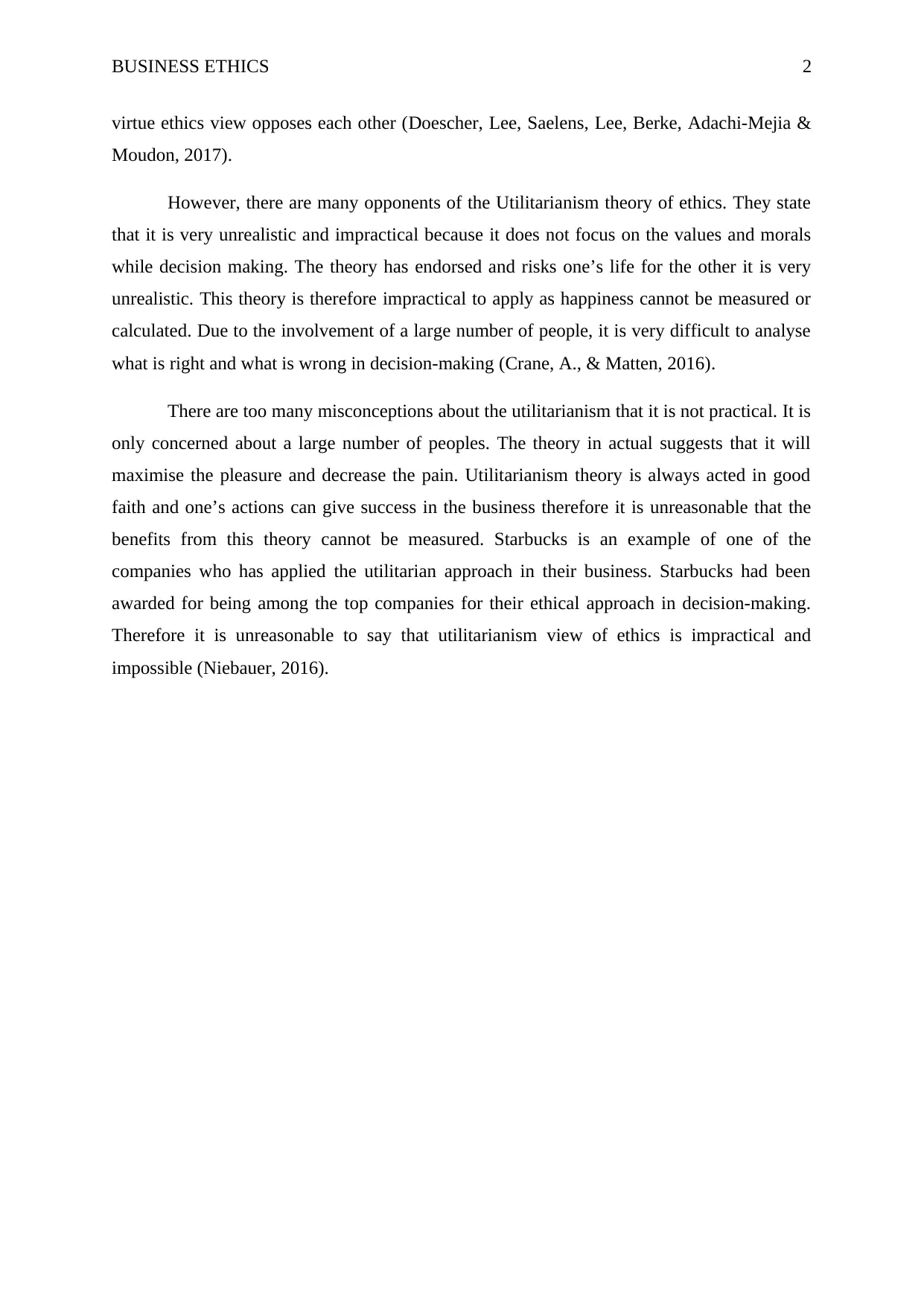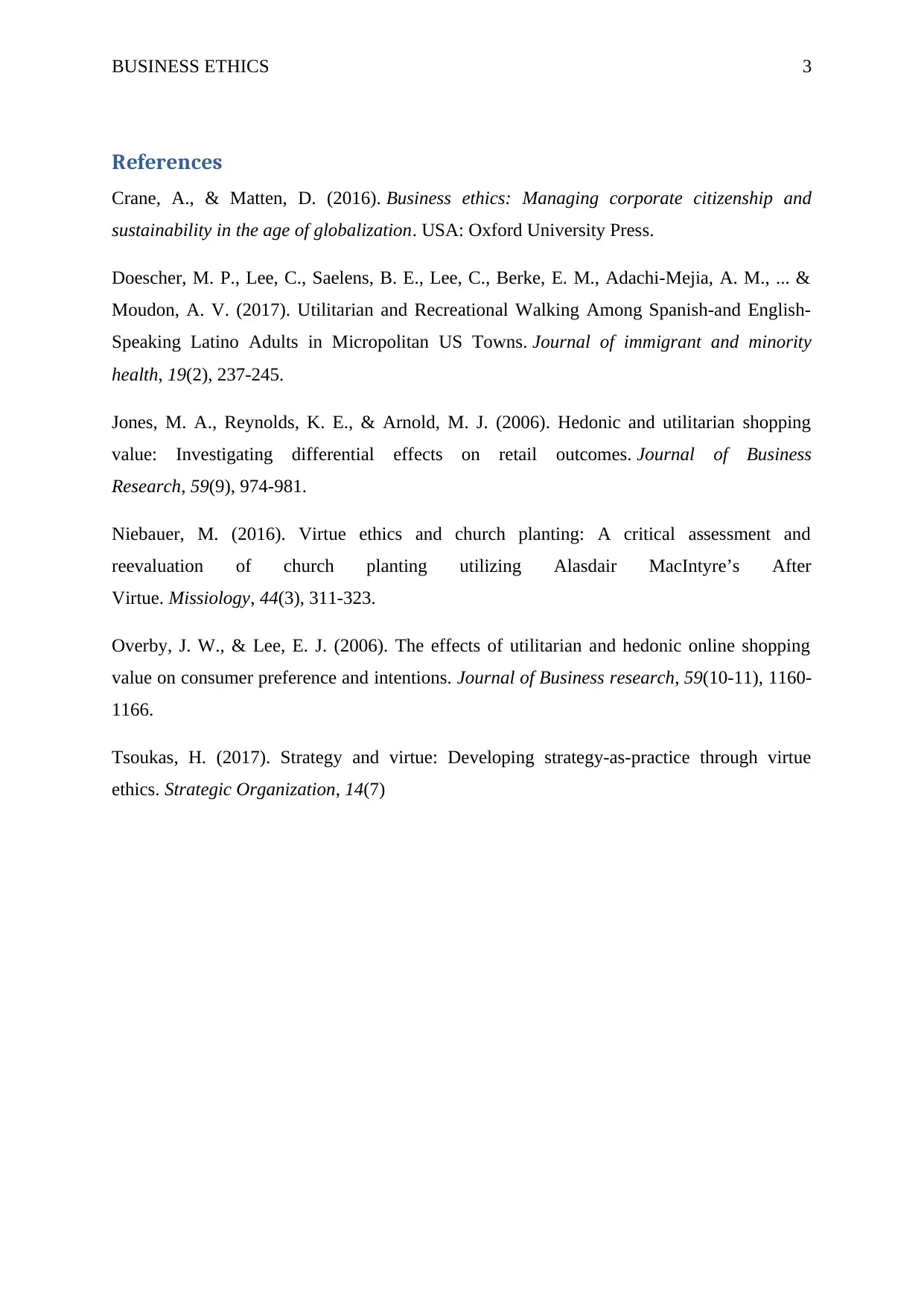Business Ethics Essay: Utilitarianism vs Other Ethics Theories
VerifiedAdded on 2023/06/03
|4
|1003
|85
Essay
AI Summary
This essay examines the utilitarian view of business ethics, arguing for its effectiveness in decision-making compared to principles and rights-based ethics, as well as virtue ethics. It highlights the core principle of utilitarianism, which aims to maximize overall well-being by increasing good outcomes and decreasing bad ones, making it a more realistic approach in business by considering the interests of a large number of people. The essay contrasts utilitarianism with principles and rights-based ethics, which emphasize individual rights, and virtue ethics, which focuses on moral character. It addresses criticisms of utilitarianism, such as its perceived impracticality and challenges in measuring happiness, while also providing examples like Starbucks to demonstrate its practical application. The essay concludes by supporting the utilitarian approach as a beneficial framework for ethical decision-making in business.

Running head: BUSINESS ETHICS
Business Ethics
Business Ethics
Paraphrase This Document
Need a fresh take? Get an instant paraphrase of this document with our AI Paraphraser

BUSINESS ETHICS 1
This thesis will support the utilitarian view of ethics. The utilitarian views of ethics
are most influential and best-known moral theory. The Utilitarian view suggests that it makes
life better by increasing the good things and by decreasing the bad things. The utilitarian
approach is more realistic in decision making in business as it takes a large number of people
interest into account. Theories of virtue ethics and principles and rights-based ethics have a
different view for the decision-making in business. In this essay, arguments will support the
utilitarian view of business in decision-making and will analyse that why the utilitarian view
is better than the views of principles and rights based ethics and virtue ethics.
Principles and rights-based ethics are concept of ethics. It states some of the rights
such as convention and natural rights; these rights have been provided to every individual.
The person can make a decision by his choice and he has every right such as right to life and
liberty. One can take the decisions without any encumbrances. This theory suggests that the
right ethical approach shall be used. The companies use this approach to achieve their vision
and mission (Tsoukas, 2017).
This theory had been mainly proposed by Aristotle. Virtue ethics are a thoughtful
reflection that what we ought to do. In modern business, there is a need to implement moral
values in the decision making of business. Virtue ethics has also stated that every individual
has some basic rights that cannot be infringed. This approach has been commonly known as
old business approach and therefore modern business avoid these approaches (Overby & Lee,
2006).
Utilitarianism ethics has opposite view than principles and rights-based ethics. The
Utilitarianism ethics has maintained a standard of minimum moral behaviour in decision-
making that must be developed. Utilitarianism has the view that the economic goods and
services should be equally distributed. It also states that sometimes it becomes necessary to
sacrifice one for a large number of peoples benefit. The principles and rights-based ethics
have the opposite viewpoint that it does not think for the benefit of a large number of peoples
but it argues for every person right (Jones, Reynolds, & Arnold, 2006).
Utilitarianism ethics has opposed views of virtual ethics as it states that good results
should be achieved by the good things like taking good decisions. The action should be done
to achieve or accomplish the achievement of happiness for the maximum peoples. It also
opposes the views of virtue ethics because sometimes happiness has been achieved from the
bad outcomes. Virtue theory is prominent in decision-making and therefore the utilitarian and
This thesis will support the utilitarian view of ethics. The utilitarian views of ethics
are most influential and best-known moral theory. The Utilitarian view suggests that it makes
life better by increasing the good things and by decreasing the bad things. The utilitarian
approach is more realistic in decision making in business as it takes a large number of people
interest into account. Theories of virtue ethics and principles and rights-based ethics have a
different view for the decision-making in business. In this essay, arguments will support the
utilitarian view of business in decision-making and will analyse that why the utilitarian view
is better than the views of principles and rights based ethics and virtue ethics.
Principles and rights-based ethics are concept of ethics. It states some of the rights
such as convention and natural rights; these rights have been provided to every individual.
The person can make a decision by his choice and he has every right such as right to life and
liberty. One can take the decisions without any encumbrances. This theory suggests that the
right ethical approach shall be used. The companies use this approach to achieve their vision
and mission (Tsoukas, 2017).
This theory had been mainly proposed by Aristotle. Virtue ethics are a thoughtful
reflection that what we ought to do. In modern business, there is a need to implement moral
values in the decision making of business. Virtue ethics has also stated that every individual
has some basic rights that cannot be infringed. This approach has been commonly known as
old business approach and therefore modern business avoid these approaches (Overby & Lee,
2006).
Utilitarianism ethics has opposite view than principles and rights-based ethics. The
Utilitarianism ethics has maintained a standard of minimum moral behaviour in decision-
making that must be developed. Utilitarianism has the view that the economic goods and
services should be equally distributed. It also states that sometimes it becomes necessary to
sacrifice one for a large number of peoples benefit. The principles and rights-based ethics
have the opposite viewpoint that it does not think for the benefit of a large number of peoples
but it argues for every person right (Jones, Reynolds, & Arnold, 2006).
Utilitarianism ethics has opposed views of virtual ethics as it states that good results
should be achieved by the good things like taking good decisions. The action should be done
to achieve or accomplish the achievement of happiness for the maximum peoples. It also
opposes the views of virtue ethics because sometimes happiness has been achieved from the
bad outcomes. Virtue theory is prominent in decision-making and therefore the utilitarian and

BUSINESS ETHICS 2
virtue ethics view opposes each other (Doescher, Lee, Saelens, Lee, Berke, Adachi-Mejia &
Moudon, 2017).
However, there are many opponents of the Utilitarianism theory of ethics. They state
that it is very unrealistic and impractical because it does not focus on the values and morals
while decision making. The theory has endorsed and risks one’s life for the other it is very
unrealistic. This theory is therefore impractical to apply as happiness cannot be measured or
calculated. Due to the involvement of a large number of people, it is very difficult to analyse
what is right and what is wrong in decision-making (Crane, A., & Matten, 2016).
There are too many misconceptions about the utilitarianism that it is not practical. It is
only concerned about a large number of peoples. The theory in actual suggests that it will
maximise the pleasure and decrease the pain. Utilitarianism theory is always acted in good
faith and one’s actions can give success in the business therefore it is unreasonable that the
benefits from this theory cannot be measured. Starbucks is an example of one of the
companies who has applied the utilitarian approach in their business. Starbucks had been
awarded for being among the top companies for their ethical approach in decision-making.
Therefore it is unreasonable to say that utilitarianism view of ethics is impractical and
impossible (Niebauer, 2016).
virtue ethics view opposes each other (Doescher, Lee, Saelens, Lee, Berke, Adachi-Mejia &
Moudon, 2017).
However, there are many opponents of the Utilitarianism theory of ethics. They state
that it is very unrealistic and impractical because it does not focus on the values and morals
while decision making. The theory has endorsed and risks one’s life for the other it is very
unrealistic. This theory is therefore impractical to apply as happiness cannot be measured or
calculated. Due to the involvement of a large number of people, it is very difficult to analyse
what is right and what is wrong in decision-making (Crane, A., & Matten, 2016).
There are too many misconceptions about the utilitarianism that it is not practical. It is
only concerned about a large number of peoples. The theory in actual suggests that it will
maximise the pleasure and decrease the pain. Utilitarianism theory is always acted in good
faith and one’s actions can give success in the business therefore it is unreasonable that the
benefits from this theory cannot be measured. Starbucks is an example of one of the
companies who has applied the utilitarian approach in their business. Starbucks had been
awarded for being among the top companies for their ethical approach in decision-making.
Therefore it is unreasonable to say that utilitarianism view of ethics is impractical and
impossible (Niebauer, 2016).
⊘ This is a preview!⊘
Do you want full access?
Subscribe today to unlock all pages.

Trusted by 1+ million students worldwide

BUSINESS ETHICS 3
References
Crane, A., & Matten, D. (2016). Business ethics: Managing corporate citizenship and
sustainability in the age of globalization. USA: Oxford University Press.
Doescher, M. P., Lee, C., Saelens, B. E., Lee, C., Berke, E. M., Adachi-Mejia, A. M., ... &
Moudon, A. V. (2017). Utilitarian and Recreational Walking Among Spanish-and English-
Speaking Latino Adults in Micropolitan US Towns. Journal of immigrant and minority
health, 19(2), 237-245.
Jones, M. A., Reynolds, K. E., & Arnold, M. J. (2006). Hedonic and utilitarian shopping
value: Investigating differential effects on retail outcomes. Journal of Business
Research, 59(9), 974-981.
Niebauer, M. (2016). Virtue ethics and church planting: A critical assessment and
reevaluation of church planting utilizing Alasdair MacIntyre’s After
Virtue. Missiology, 44(3), 311-323.
Overby, J. W., & Lee, E. J. (2006). The effects of utilitarian and hedonic online shopping
value on consumer preference and intentions. Journal of Business research, 59(10-11), 1160-
1166.
Tsoukas, H. (2017). Strategy and virtue: Developing strategy-as-practice through virtue
ethics. Strategic Organization, 14(7)
References
Crane, A., & Matten, D. (2016). Business ethics: Managing corporate citizenship and
sustainability in the age of globalization. USA: Oxford University Press.
Doescher, M. P., Lee, C., Saelens, B. E., Lee, C., Berke, E. M., Adachi-Mejia, A. M., ... &
Moudon, A. V. (2017). Utilitarian and Recreational Walking Among Spanish-and English-
Speaking Latino Adults in Micropolitan US Towns. Journal of immigrant and minority
health, 19(2), 237-245.
Jones, M. A., Reynolds, K. E., & Arnold, M. J. (2006). Hedonic and utilitarian shopping
value: Investigating differential effects on retail outcomes. Journal of Business
Research, 59(9), 974-981.
Niebauer, M. (2016). Virtue ethics and church planting: A critical assessment and
reevaluation of church planting utilizing Alasdair MacIntyre’s After
Virtue. Missiology, 44(3), 311-323.
Overby, J. W., & Lee, E. J. (2006). The effects of utilitarian and hedonic online shopping
value on consumer preference and intentions. Journal of Business research, 59(10-11), 1160-
1166.
Tsoukas, H. (2017). Strategy and virtue: Developing strategy-as-practice through virtue
ethics. Strategic Organization, 14(7)
1 out of 4
Related Documents
Your All-in-One AI-Powered Toolkit for Academic Success.
+13062052269
info@desklib.com
Available 24*7 on WhatsApp / Email
![[object Object]](/_next/static/media/star-bottom.7253800d.svg)
Unlock your academic potential
Copyright © 2020–2026 A2Z Services. All Rights Reserved. Developed and managed by ZUCOL.





